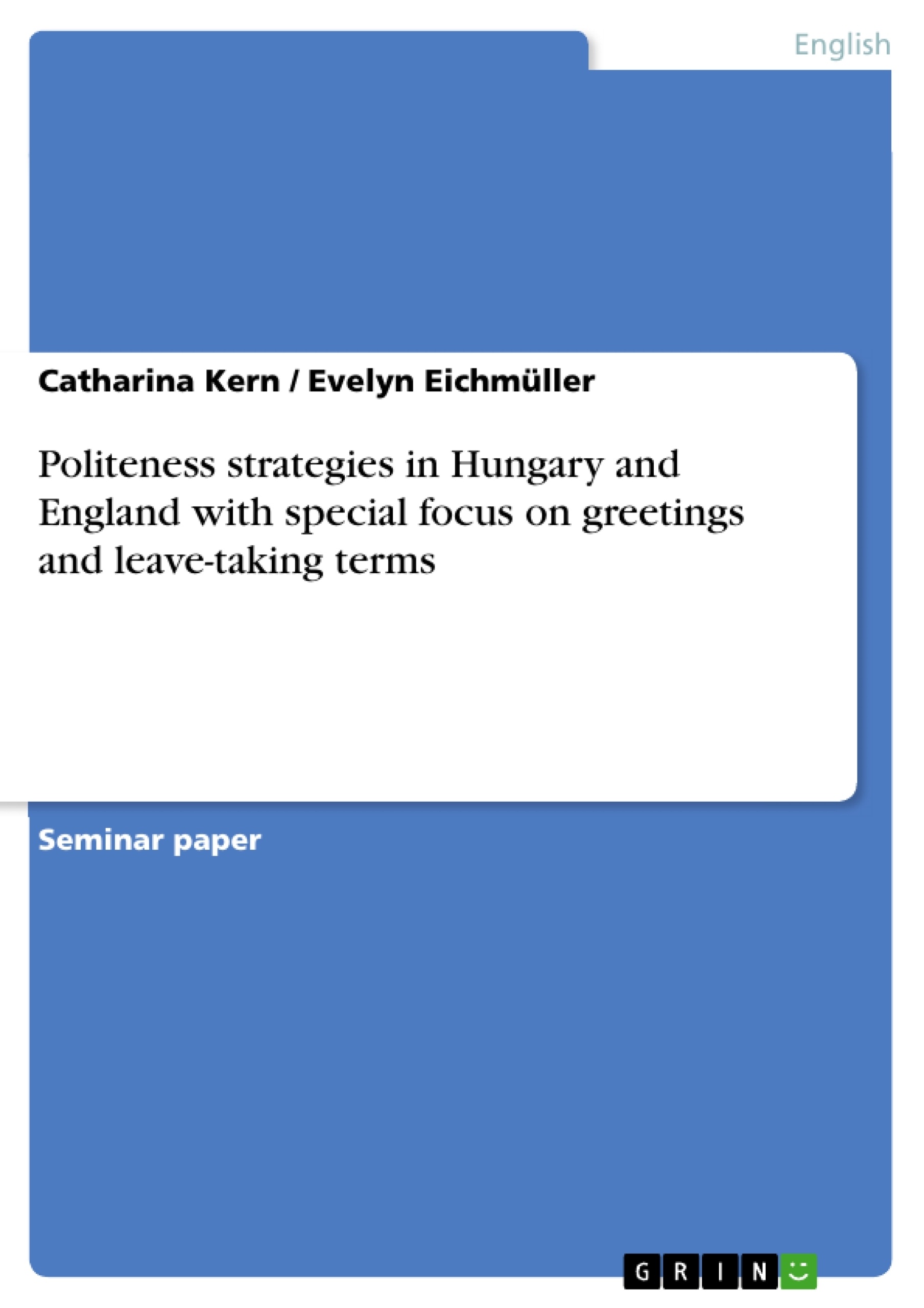Unsere Hausarbeit für das Seminar Eurolinguistics bei Dr. Grzega schrieben wir über Höflichkeitsformen in Ungarn und England mit Fokus auf Begrüßungs- und Abschiedsformeln (Politeness strategies in Hungary and England with special focus on greetings and leave-taking terms). Interessant wurde dieses Thema für uns vor dem Sommersemester 2006, nach einem Urlaub in Ungarn, in dem wir der Vielfalt der Begrüßungs- und Höflichkeitsformen in dieser Sprache gewahr wurden und sie bewusst wahrnahmen. Als Studentinnen des Faches Anglistik ist es offensichtlich, dass die Englische Sprache Mittelpunkt unseres Interesses ist. So kamen wir auf die Idee, zunächst nur Begrüßungsformeln miteinander zu vergleichen, bis wir sahen, wie sehr dieses Thema eigentlich mit Höflichkeit verflochten ist.
Um neben einem Theorieteil, in welchem wir uns in der Diskussion um Höflichkeitsformen auf andere wissenschaftliche Quellen beziehen, auch einen Praxisbezug in die Hausarbeit mit aufzunehmen, gab uns Dr. Grzega eine Vorlage eines Fragebogens, den er zuvor für andere Studienzwecke entworfen hatte; nach kleinen Änderungen verteilten wir diesen an 25 Engländer und 25 Ungarn im Alter von 14 bis 89 Jahren in einem recht ausgewogenen Verhältnis von 48% männlichen und 52% weiblichen Teilnehmern. Diese werteten wir getrennt voneinander aus, um sie später dann in der Seminararbeit miteinander zu vergleichen, um Übereinstimmungen, sowie auch Unterschiede feststellen zu können.
Ungarn ist stark von seiner Geschichte und von Traditionen geprägt, und vor allem aus seiner Zeit der österreichisch-ungarischen Monarchie, was in einigen gängigen Begrüßungsformeln erkennbar wird. Das förmliche Siezen tritt ungewöhnlich häufig auf, auffallend vor allem in Familienkreisen gegenüber älteren Verwandten, die mit dem Vornamen, Tante/Onkel und Sie angesprochen werden. Der Vergleich zum Englischen ist hier natürlich schwierig, da das archaische thou nicht mehr gebräuchlich ist und durch das umfassende you ersetzt wurde.
Im Allgemeinen ist es so, dass die Magyaren zu den contact cultures gehören und somit auch schnell die Nähe des Gesprächspartners suchen, sei es durch mehr Körperkontakt bei einer Unterhaltung oder der Begrüßung mit Küsschen, die in einer distance culture wie der der Briten nur bei sehr engem sozialen Kontakt üblich sind.
Inhaltsverzeichnis (Table of Contents)
- Greetings and leave-taking terms
- Introduction
- Politeness in comparison
- General
- Different aspects of politeness
- Positive/Negative Politeness
- Directness/indirectness
- Avoidance of face-threatening acts
- Apologies
- Address Forms
- Address Forms in England
- Address Forms in Hungary
- English and Hungarian greetings
- Variables for the choice of greetings
- Verbal and nonverbal greetings
- Greeting formulae
- Day
- Meet again
- International
- Greeting Changes
- Health
- Farewells
- Evaluation and comparison of the English and the Hungarian questionnaire
- Conclusion
- Abstrakt
- Bibliography
- Appendix
- Questionnaire
Zielsetzung und Themenschwerpunkte (Objectives and Key Themes)
The paper examines politeness strategies in England and Hungary, with a special focus on greetings and leave-taking terms. It aims to explore the cultural influences that shape politeness and how these differences manifest in linguistic practices. The paper utilizes a questionnaire to analyze real-world data and compare theoretical concepts with practical observations.
- Cultural Influences on Politeness
- Cross-Cultural Communication and Language Differences
- The Role of Greetings in Establishing Social Relationships
- Analysis of English and Hungarian Politeness Strategies
- The Impact of History and Cultural Change on Language Use
Zusammenfassung der Kapitel (Chapter Summaries)
- Greetings and leave-taking terms: Introduction: This chapter discusses the importance of politeness in communication and introduces the concept of cultural influences on language use. It highlights the central role of greetings in shaping first impressions and influencing conversation dynamics.
- Politeness in comparison: General: This chapter provides a brief overview of Hungarian history and cultural influences on politeness. It examines the distinction between traditional and recent cultural paradigms in Hungary, highlighting the contrasting approaches to politeness.
- English and Hungarian greetings: Variables for the choice of greetings: This chapter examines the factors that influence the choice of greetings in both languages, including social context, relationship dynamics, and cultural norms.
- Farewells: This chapter delves into the specific linguistic features and cultural practices related to leave-taking in England and Hungary.
- Evaluation and comparison of the English and the Hungarian questionnaire: This chapter presents the results of the questionnaire study, comparing the theoretical concepts of politeness with real-world data and analyzing the findings for both languages.
Schlüsselwörter (Keywords)
This paper explores politeness strategies, cross-cultural communication, language differences, greetings, leave-taking, cultural influences, Hungary, England, social interaction, linguistic analysis, questionnaire study.
- Quote paper
- Catharina Kern (Author), Evelyn Eichmüller (Author), 2006, Politeness strategies in Hungary and England with special focus on greetings and leave-taking terms, Munich, GRIN Verlag, https://www.hausarbeiten.de/document/70886


